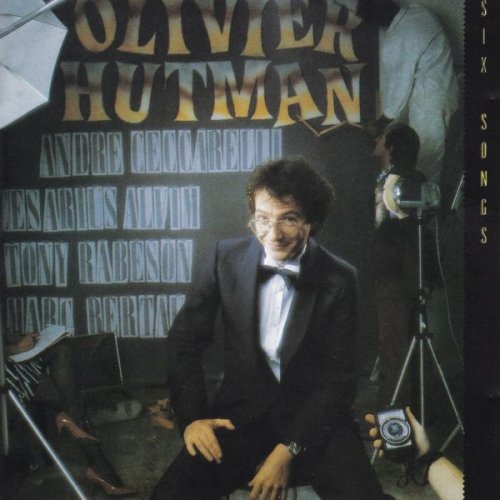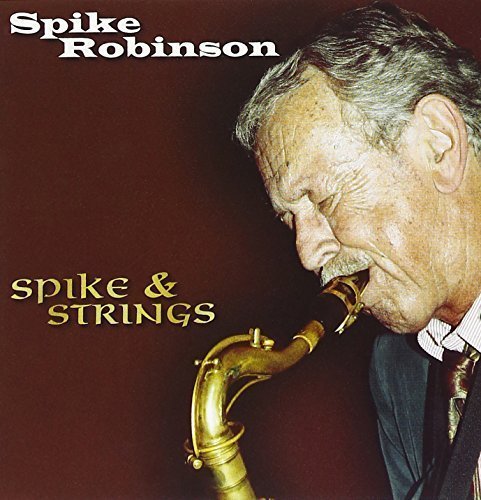Ettore Panizza - Gluck: Alceste (1997)
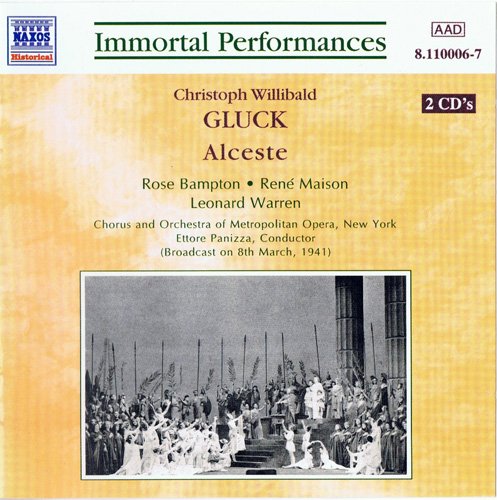
Artist: Ettore Panizza
Title: Gluck: Alceste
Year Of Release: 1997
Label: Naxos
Genre: Classical
Quality: APE (image + .cue, log, scans)
Total Time: 02:17:33
Total Size: 389 MB
WebSite: Album Preview
Tracklist:Title: Gluck: Alceste
Year Of Release: 1997
Label: Naxos
Genre: Classical
Quality: APE (image + .cue, log, scans)
Total Time: 02:17:33
Total Size: 389 MB
WebSite: Album Preview
CD 1
01. Introduction - 01:29
02. Overture - 06:51
03. Scene I: Dieux! rendez-nous roi, notre pere - 03:41
04. Scene II: O malheureux Admete - 06:19
05. Grand Dieux! du destin qui m'accable - 09:51
06. Air - Pantomime - 04:07
07. Scene III: Dieu puissant! ecarte du Trone - 06:18
08. Scene IV: Immortel Apollon! - 01:45
09. Air - Pantomime pour le Sacrifice - 02:12
10. Recitatvie: Apollon est sensible a nos gemissements - 05:35
11. Scene V: Ou suis-je? O malheureuse Alceste! - 05:06
12. Scene VI: Tes destins sont remplis - 02:00
13. Scene VII: Divinites du Styx - 05:05
14. Commentary - 01:06
CD 2
01. Commentary - 00:22
02. Scene I: Que les plus doux transports succedent aux alarmes - 01:19
03. Divertissement - G Minor Andante - 01:39
04. Divertissement - G Minor Allegro - 01:33
05. Scene II: O Mon Roi! notre appui! notre pere! - 02:20
06. Chorus: Vivez aimez des jours - 01:27
07. Scene III: Cher epoux! O moment fortune - 00:35
08. Parez vos fronts de fleurs nouvelles - 06:57
09. O moments delicieux!…Bannis la erainte et les alarmes - 03:32
10. Ciel…Tu pleures? - 08:41
11. Scene IV: Grands Dieux! pour mon epoux j'implore vos secours…Tant de graces - 02:44
12. Ah! malgre moi - 10:29
13. Commentary - 01:38
14. Introduction To Act III - 00:37
15. Scene I: Grands Dieux! soutenez mon courage - 04:31
16. Malheureuse! ou vas-tu? - 00:58
17. Ah! Divinites implacables! - 02:44
18. Scene ii: Ciel Admete! o moment terrible! - 02:02
19. Alceste, au nom des Dieux! - 02:07
20. Caron t'appelle, entends sa voix - 02:51
21. Divertissement - G Major Andante - 02:51
22. Final Scene: Admete, O mes amis Alceste m'est rendue - 00:23
23. Divertissement - G Major Andante - 00:54
24. Divertissement - D Major March - 01:54
25. Divertissement - A Major Andante - 02:07
26. Divertissement - D Major Chaconne - 01:52
27. Chorus & Dance: Vivez aimez des jours - 02:03
28. Curtain Calls And Closing Commentary By Milton Cross - 04:57
Christoph Willibald Gluck (1714 - 1787): Alceste [French version, written for Paris in 1776]. Cast: Rose Bampton (Alceste); René Maison (Admète); Leonard Warren (High Priest); George Cehanovsky (Herald); Alessio De Paolis (Evandre); Arthur Kent (Voice of Apollon); Marita Farell (Woman); Maxine Stellman, Helen Olheim, Wilfred Engelman (Leaders of the People); Choir and Orchestra of the Metropolitan Opera, New York; Chorus Master: Fausto Cleva; Conductor: Ettore Panizza. Recorded live by NBC Radio on 9th March 1941. Published as a 2 CD box by Naxos Historical in 1997 (8.110006-7) as part of the "Immortal Performances" series. Total playing time (including radio commentary): 137'37".
Although this performance was only broadcast one week before the fairly successful "Carmen", there is a great difference in standard, both with regard to the performance itself and with a view to the recording quality. The performance, as one can see from the black and white photo on the cover, was quite a vast affair, the huge Metropolitan Opera stage being filled with an enormous choir, dancers, etc. The lead singer was originally to be Marjorie Lawrence, but as she was indisposed, she was replaced by Rose Bampton, who managed reasonably well under the circumstances, but whose French was, like that of most of the participants, pretty disastrous. Although her soaring voice captures a good deal of the emotion involved in the piece, she can scarcely, if ever, be understood. René Maison, on the other hand, a Belgian, was able to sing French idiomatically, his problem being his somewhat nasal, theatrical voice, which Naxos, in their notes, correctly characterize as "never memorable". The choir is so enormous that, in mono sound, there is no chance of hearing any detail, while the orchestra, interrupted as it is by the smokers' cough of audience members, struggles and cannot always convince (let alone by today's baroque standards). But the real Achilles' heel of all this is the recorded sound, which is so faint and distant that one occasionally has difficulties in hearing anything at all. Turning up the volume helps a little, but it is perfectly obvious that the original radio engineers had bitten off more than they could chew with this enormous production, and Richard Caniell's "restoration", however good it may or may not be, just cannot "restore" what was never there in the first place. The puny mono signal and the very limited range make for some excruciating listening, so that this set can really only be recommended to those who are old enough to have heard the original broadcasts, to those who must have everything the Met ever produced and to dyed-in-the-wool nostalgia lovers. -- Leslie Richford
Although this performance was only broadcast one week before the fairly successful "Carmen", there is a great difference in standard, both with regard to the performance itself and with a view to the recording quality. The performance, as one can see from the black and white photo on the cover, was quite a vast affair, the huge Metropolitan Opera stage being filled with an enormous choir, dancers, etc. The lead singer was originally to be Marjorie Lawrence, but as she was indisposed, she was replaced by Rose Bampton, who managed reasonably well under the circumstances, but whose French was, like that of most of the participants, pretty disastrous. Although her soaring voice captures a good deal of the emotion involved in the piece, she can scarcely, if ever, be understood. René Maison, on the other hand, a Belgian, was able to sing French idiomatically, his problem being his somewhat nasal, theatrical voice, which Naxos, in their notes, correctly characterize as "never memorable". The choir is so enormous that, in mono sound, there is no chance of hearing any detail, while the orchestra, interrupted as it is by the smokers' cough of audience members, struggles and cannot always convince (let alone by today's baroque standards). But the real Achilles' heel of all this is the recorded sound, which is so faint and distant that one occasionally has difficulties in hearing anything at all. Turning up the volume helps a little, but it is perfectly obvious that the original radio engineers had bitten off more than they could chew with this enormous production, and Richard Caniell's "restoration", however good it may or may not be, just cannot "restore" what was never there in the first place. The puny mono signal and the very limited range make for some excruciating listening, so that this set can really only be recommended to those who are old enough to have heard the original broadcasts, to those who must have everything the Met ever produced and to dyed-in-the-wool nostalgia lovers. -- Leslie Richford
Related Release:
![Mark Nightingale, Alan Barnes & James Davison - Jazz Classics ...with a Twist (2026) [Hi-Res] Mark Nightingale, Alan Barnes & James Davison - Jazz Classics ...with a Twist (2026) [Hi-Res]](https://www.dibpic.com/uploads/posts/2026-02/1772036652_1.jpg)
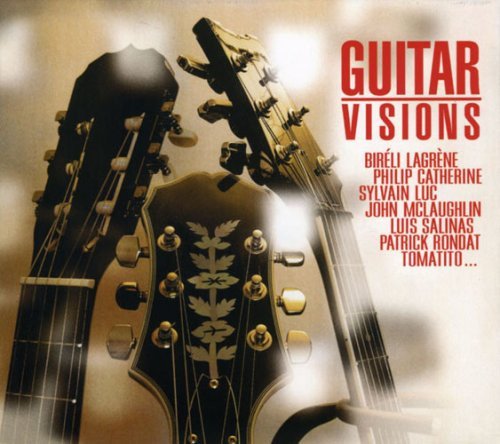

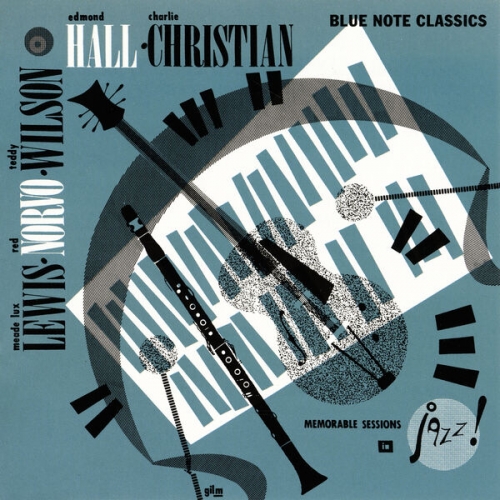
![Kobert - Off the Hook (2011) [Hi-Res] Kobert - Off the Hook (2011) [Hi-Res]](https://www.dibpic.com/uploads/posts/2026-03/1772434077_lnz36qc7wmx6u_600.jpg)
